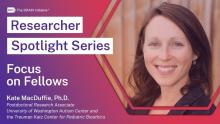
Dr. Kate MacDuffie is an F32 award recipient whose research focuses on the neuroethical use of magnetic resonance imaging (MRI) to predict autism spectrum disorder in infancy. The F32 funding opportunity supports the research training of promising researchers early in their postdoctoral training period.
The NIH BRAIN Initiative funding portfolio enables the collaborative and multidisciplinary research necessary to help us understand the brain’s complexities. Dr. Kate MacDuffie received a BRAIN Initiative F32 Individual Postdoctoral Fellowship award to support her research on the neuroethics of predictive clinical diagnosis of autism spectrum disorder in infants who are pre-symptomatic. The F32 program rewards promising postdoctorates early in their careers by enhancing their research training in project areas that advance the goals of the NIH BRAIN Initiative. Applicants do not need to provide preliminary data and can submit their applications before joining the post-doctoral program. The next deadline to apply for an F32 award is December 9, 2022.
Check out the interview below to learn more about Dr. MacDuffie’s F32-funded neuroethics research. She discusses her NIH BRAIN Initiative project and how she became interested in her field of research, in addition to challenges, next steps, and advice she’d give to other early career researchers interested in the F32 program.
Would you please briefly introduce yourself?
Kate MacDuffie (she/her), I’m currently a postdoc at the University of Washington Autism Center and the Treuman Katz Center for Pediatric Bioethics at Seattle Children’s. My academic training is in the areas of neuroscience, clinical psychology, and bioethics. My F32 project was focused on the ethics of using Magnetic Resonance Imaging (MRI) to predict autism spectrum disorder in infancy.
What led you to research? What continues to drive your ambitions as a scientist?
I first became interested in neuroscience in high school when my grandmother was diagnosed with Alzheimer’s disease. I started reading everything I could to try and understand what was happening to her. My first research experiences were working in Alzheimer’s and memory labs, and I loved the combination of getting to think about interesting questions that no one has the answers to and doing work that was likely to improve the lives of people impacted by memory disorders. These two elements continue to motivate my academic career; I love having the freedom to explore questions that I find deeply interesting and doing work that will positively impact society.
What major unanswered questions do you hope to address?
The two central questions that motivate my research are: 1) What are the impacts of advances in neuroscience on individuals and families affected by neurodevelopmental, psychiatric, or neurological conditions? 2) How can anticipating these impacts shape (and improve) future neuroscience research?
What are some of the challenges you have encountered in your research and/or career? How have you or how are you working to overcome them?
Managing competing responsibilities has and continues to be a challenge for me. I’m interested in many different research questions and find it exciting to get involved in new projects, but then I risk getting overcommitted. My best strategy for managing this is to try and stay organized and carefully evaluate priorities for what needs to happen for each project and when.
What would be the next step in your research (or professional development)?
In the fall, I will be joining the faculty of the Treuman Katz Center for Pediatric Bioethics at Seattle Children’s Research Institute. In this role I look forward to continuing to conduct empirical bioethics research and mentor the next generation of bioethicists/neuroethicists.
What would be your advice to others who may want to apply to the BRAIN F32 program?
Writing a grant (especially your first) can be intimidating, but it is so worth the effort! Even if you don’t get awarded on your first try, you still learn so much through the process that will help you later. After my F32, I applied for a K99/R00 [RFA-NS-19-043 and RFA-NS-19-044] through the BRAIN Initiative and found the second grant much easier to write after the F32. My F32 years allowed me really precious time to gain essential new skills and training that I wouldn’t have been able to pursue otherwise. Give a gift to your future self and apply!
Are there any specific relevant training and professional development opportunities that you find useful during the fellowship?
The F32 allowed me the time to pursue coursework and mentorship in bioethics, which was a new area for me. I completed a master’s degree in bioethics with the courses I did during the F32 and established mentorship relationships in bioethics that will last me the rest of my career.
Fill in the blank: When I’m not working on a research project, I am…
Exploring the beautiful woods and waters of Washington State.
Stay tuned for more highlights on BRAIN Initiative award recipients in some exciting, upcoming series on the BRAIN Blog.
